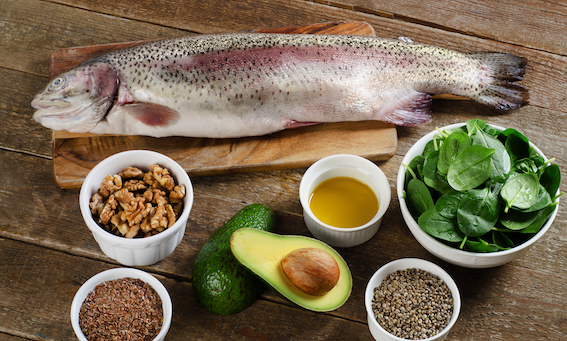Cutting out sugars and fats may seem like the easiest way to keep your New Year’s resolution to shed those unwanted pounds, but eliminating these substances entirely isn’t good for your health. Instead, focus on choosing healthy sugars and fats that will help you achieve your weight loss goal.
A Healthy Diet Must Include Fats and Sugars
Fats are an essential part of your diet. They provide energy, help your nerves and brain function optimally, keep your skin healthy and transport Vitamins A, D, E and K throughout your body. Sugars are simple carbohydrates that also provide energy. If they’re not needed, they’re converted to fats and stored by the body.
Good and Bad Fats
Although your body needs fats and sugars, some types are better than others. Saturated and trans fats make your favorite potato chips, cakes and doughnuts tasty, but they lead to extra pounds. They can also increase your risk of developing high cholesterol, heart disease and stroke. When Harvard researchers studied the reasons that the average adult tends to gain one pound per year, they discovered that people who ate potatoes, potato chips and beverages sweetened with sugar experienced the greatest weight gain.
Polyunsaturated and monounsaturated fats and omega-3 fatty acids are the better choice. They’re found in foods like vegetable oils, nuts and fish. Although these fats are healthier, they can also lead to weight gain if you eat too much of them.
Natural Sugar Is Best
Your body needs sugar to create the energy you need to get through the day, but all sugars are not created equal. Healthy sugars found naturally in fruits, vegetables and milk are better for you because these foods also contain nutrients, including potassium, Vitamin C, calcium, protein and carbohydrate fiber.
 Foods that contain added sugars usually don’t offer the same nutritional value as foods with only natural sugars. You’ll find added sugar in soft drinks, fruit drinks, ice cream, cookies, candy and fruits canned in syrup. Some foods you may consider to be healthy, such as yogurt or granola bars, may contain surprisingly high amounts of added sugar.
Foods that contain added sugars usually don’t offer the same nutritional value as foods with only natural sugars. You’ll find added sugar in soft drinks, fruit drinks, ice cream, cookies, candy and fruits canned in syrup. Some foods you may consider to be healthy, such as yogurt or granola bars, may contain surprisingly high amounts of added sugar.
Choosing Foods with Healthy Fats
Add foods with healthy fats to your diet, including:
- Poultry
- Lean meats
- Walnuts and sunflower seeds
- Salmon
- Herring
- Trout
- Mackerel
- Sardines
- Tuna (tuna can be high in mercury, so it’s best to eat it only several times per month)
- Foods that contain soybean, canola or flaxseed oil
Reduce your saturated fat intake by trimming the fat off red meat before you cook it and removing the skin from poultry. Look for low-fat versions of foods, such as skim milk or low-fat cheese. Skip foods that contain whole milk or coconut, palm, palm kernel or palm fruit oils or partially hydrogenated vegetable oils. Don’t cook with solid fats, such as shortening, butter or lard. Use olive, canola or sunflower oil instead.
Satisfy Your Sweet Tooth with Natural Sugars
Get your sweet fix naturally with these foods, many of which you’ll find at farmers’ markets in the Triangle area:
- Low-fat milk
- Strawberries
- Grapes
- Plums
- Peaches
- Berries
- Cherries
- Watermelons
- Apples
- Pears
- Pineapple
- Melons
- Kiwi
- Papayas
- Olives
- Tomatoes
- Cucumbers
- Eggplant
- Spinach
- Summer Squash
- Beans
- Sweet Potatoes
Staying Strong
Sticking to your new diet plan may be a little difficult at first, particularly if there’s birthday cake at work or if an order of fries is just too hard to resist. Don’t worry if you slip occasionally. A treat here or there won’t completely derail your diet plan. After you’ve been watching your sugar and fat intake for a few months, you just might find you no longer want any of those high-fat, sugary foods.
Need a little help making healthy food choices? Call Lifestyle Medical Center. Our team will evaluate your current diet and help you make changes that can make your New Year’s resolution resolution to lose weight a reality.
Sources:
American Heart Association: Saturated Fats
Health.gov: Fats, Added Sugars and Salt
American Heart Association: Sugar 101

